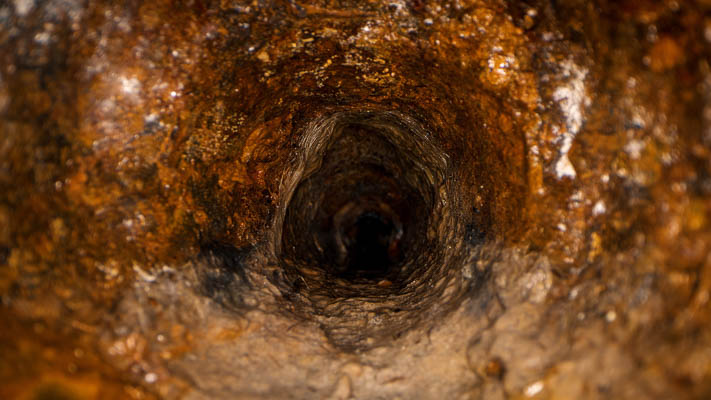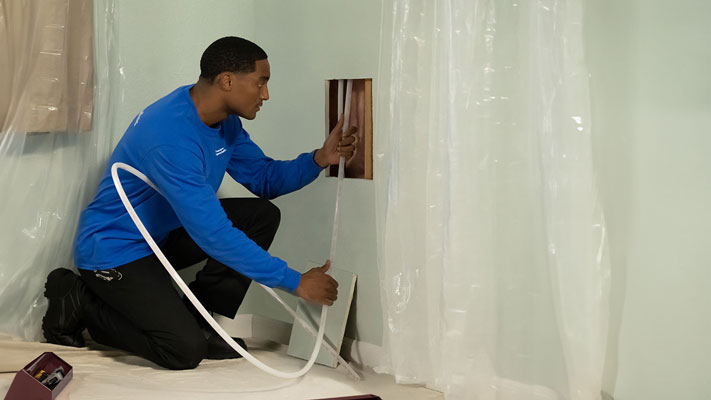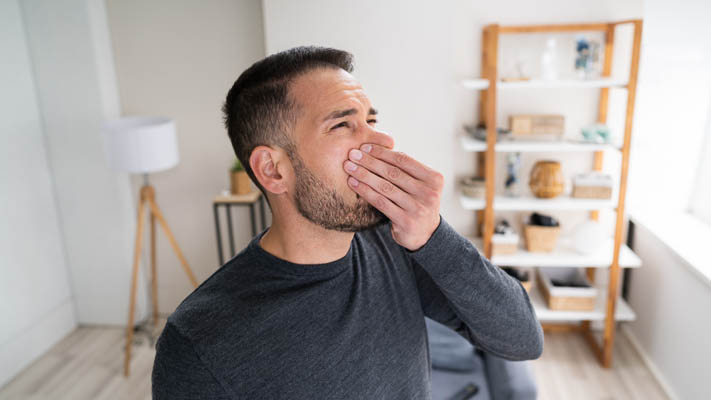Common Reasons Your Drain Smells
A smelly drain can stem from a range of everyday issues. Many are quick to fix, but some may indicate larger problems brewing below the surface.
- Food, grease, and organic buildup: In kitchen drains, trapped food particles and grease are often the primary culprits. Over time, even small scraps that slip past your strainer can stick to the inside of your pipes, where bacteria begin to grow. This bacterial buildup creates a sour or rotting odor that only worsens the longer it's left untreated.
- Biofilm and soap scum: In bathroom sinks, showers, and tubs, soap, toothpaste, and shampoo can combine with skin oils and hair to form a sticky, slimy substance known as biofilm. This clings to the walls of pipes and harbors bacteria, which causes musty or stale odors—particularly in seldom-used drains.
- Dry or faulty P-traps: P-traps are the curved sections of pipe under your sink or drain. They hold water, which acts as a barrier to block sewer gases from wafting into your home. If a drain isn't used regularly or the water in the trap evaporates, that barrier disappears, and the smell of sewage can enter your home.
- Sewer gas or venting issues: In some cases, the issue is more than surface-level. If your plumbing's venting system is blocked or poorly installed, it can cause pressure imbalances that push foul-smelling sewer gas into your drains—or worse, into your living space.
Identifying the Source of Bad Smelling Drains
When trying to locate the cause of a smelly drain, it's important to pay attention to both where and when the smell occurs. This can help narrow down the root of the issue.
Ask yourself:
- Is the smell coming from just one drain or several?
- Does it happen after using a particular appliance (like the dishwasher or washing machine)?
- Is it worse in certain weather conditions (like heavy rain)?
If the odor is coming from one drain (for example, your kitchen sink), it's likely a local issue, such as food buildup or a dry trap. These are typically easy to resolve with a thorough cleaning.
If multiple drains are emitting odors, particularly at the same time, this points to a deeper systemic issue, possibly involving your main sewer line or vent stack. These problems require professional investigation and are often symptoms of aging or compromised piping.
Odors can also stem from bacteria accumulating around the drain cover or within the overflow channel (common in bathroom sinks). A quick surface clean might not be enough if the smell returns shortly after.
Could Outdated Pipes Make My Drains Smell Bad?
Outdated or deteriorating pipes can absolutely contribute to foul-smelling drains. In fact, if your home still has original plumbing from decades past, the material itself may be part of the problem.
Three common outdated materials that can cause odor issues include:
- Galvanized steel pipes: These corrode from the inside out, trapping debris and fostering bacterial growth. Over time, they can emit metallic or sulfuric smells.
- Cast iron drain lines: While durable, cast iron pipes are prone to rust, scale buildup, and cracking. Internal corrosion creates rough surfaces where waste clings and decomposes.
- Clay or Orangeburg pipes: These older materials (used in outbound sewer lines) often crack or collapse under pressure, allowing wastewater to leak and odors to escape into the ground—and sometimes back into your home.

Outdated pipes may also have degraded seals and joints, allowing sewer gas leaks, particularly at connection points. Unlike visible leaks, these can be hard to detect but are often accompanied by persistent, foul smells throughout the house.
In these cases, cleaning or surface repairs won't be enough. If your home's plumbing system is aging or built from obsolete materials, it may be time to consider a full replacement to eliminate the problem at its source.
Can Repiping Solve Ongoing Odor Issues?
If you've tried every drain-cleaning tip in the book and the smell keeps coming back, the problem might not be your sink—it might be your system. Repiping your home can permanently fix persistent drain odors by addressing the underlying causes head-on.
Repiping works by removing the source of the odor at its root. Outdated pipes—like those made from galvanized steel or cast iron—tend to corrode, trap waste, and develop leaks. These issues can allow sewer gas to escape and foul smells to linger, even after repeated cleaning.
Although we don't reline sewer or drain lines, when it comes to outbound waste lines, we always recommend a complete repipe—typically using PVC, unless local regulations require ABS.
At Repipe Specialists, all of our repipes utilize American-made Type-L copper or Uponor PEX-A tubing for fresh water lines. These materials offer smoother surfaces that resist residue and improve water flow. This helps prevent standing water and waste buildup—both major contributors to bad drain smells.

We've streamlined the repipe process to take just 1 to 2 days for most homes. Our crews run new pipes through the walls using a central manifold, keeping disruption to a minimum. With our One-Stop Repipe™ Process, we handle permits, inspections, patching, and cleanup—so you get clean, odor-free plumbing without the hassle.
Feel free to contact us to schedule a free consultation with one of our local repipe consultants.
Get your free estimate today
With over 75,000 repipes completed, we've perfected our One-Stop Repipe™ for your home.
Get a Quote for Your Home Repipe
Here at Repipe Specialists, we've fully replaced the plumbing in over 75,000 homes since 1991, using both copper piping and PEX tubing. We consistently receive positive feedback from customers about their overall home repipe experience and often exceed expectations in areas such as:
- Speed: Our repipe crews typically complete a repipe in a day, returning on another day for wall patching.
- Convenience: Through our One-Stop Repipe™ Process, we handle everything from permits, to wall patching, to inspections.
- Cleanliness: Our crews are trained to protect your home while working (we cover all surfaces with protective sheeting), and to clean up fully at the end of each day.
- Peace of Mind: Repipe Specialists is a fully licensed plumber in every state we operate in, and we back all of our repipes with a lifetime warranty.
- Financing programs: To help take the sting out of unplanned repipe expenses, we offer several financing programs.
- Price: As a specialist that performs hundreds of repipes a week, we can deliver high quality repipes at a lower cost vs generalist plumbers. We have an article that covers repipe cost factors in detail. Our quotes typically range from $4,500 to $15,000 depending on the size and complexity of your project.
Schedule a free in-home consult, and one of our local repipe consultants will explain all your repipe options and provide you with a written, fixed-price quote.

